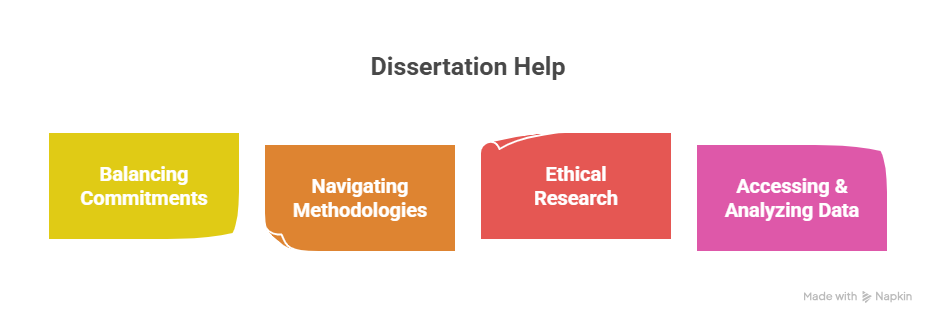The journey of writing a psychology dissertation is undoubtedly one of the most intellectually stimulating yet profoundly demanding phases of higher education. For psychology students in India, it represents a unique opportunity to contribute original research to the vast, multifaceted field of human behavior and mind. However, navigating the intricate demands of rigorous research, complex methodologies, stringent academic standards, and often, personal commitments, can frequently feel overwhelming. This comprehensive guide is meticulously crafted to demystify the entire process, offering practical insights and strategic advice specifically tailored to help you excel in your psychology dissertation within the dynamic Indian academic landscape.
Table of Contents
Why a Focused Psychology Dissertation Guide is Crucial for Indian Scholars
The academic environment for psychology in India is vibrant and continually evolving, expertly blending deep theoretical traditions with a rapidly growing emphasis on empirical, applied, and culturally relevant research. A specialized psychology dissertation help guide like this is vital because it directly addresses the specific challenges and unique opportunities that Indian students often encounter:
- Balancing Multiple Commitments: Many Indian psychology students manage concurrent internships, part-time jobs, or significant family responsibilities alongside their demanding academic schedules. This guide offers practical time management strategies, helping you segment the dissertation into manageable parts and set realistic, achievable deadlines. It’s about optimizing your workflow to fit your life, not just your studies.
- Navigating Diverse Methodologies: Psychology demands mastery of varied research designs – from rigorous quantitative experiments and large-scale surveys to rich qualitative interviews, ethnographic studies, and in-depth case studies. This psychology dissertation help resource simplifies complex methodological choices, guiding you to select the most appropriate approach for your specific research question and adapting it sensitively and effectively to the nuanced Indian cultural context.
- Ethical Research in a Diverse Landscape: Conducting psychological research in India involves unique and critical ethical considerations. This guide emphasizes understanding and rigorously adhering to ethical guidelines concerning cultural sensitivity, obtaining genuine informed consent from diverse populations (considering literacy levels, local languages, and community norms), and ensuring stringent data privacy. These steps are crucial to ensure your study is not only scientifically sound but also ethically robust and respectful of participants’ rights and dignity.
- Accessing & Analyzing Data Effectively: Whether you’re collecting data from schools, clinical settings, community organizations, or the general public, this psychology dissertation help guide offers practical advice on data collection strategies, including participant recruitment and instrument administration. It also provides essential insights into using key software like SPSS or R for quantitative analysis, or NVivo or ATLAS.ti for qualitative thematic analysis – tools indispensable for modern psychological research.
Your Roadmap to a Standout Psychology Dissertation
While every dissertation is a unique scholarly endeavor, a structured, systematic approach is paramount for guaranteed success. This psychology dissertation help roadmap breaks down the entire journey into clear, actionable stages, designed to empower you at every step:
1. Conceptualization and Proposal Development: Igniting Your Research Idea
This initial phase is where your intellectual curiosity transforms into a focused, viable research question. It’s the blueprint for everything that follows.
- Topic Selection: Identify a genuine gap in existing psychological literature, explore a fascinating, under-researched psychological phenomenon, or investigate a pressing social or clinical issue through a robust psychological lens. Consider areas like mental health, cognitive psychology, social psychology, developmental psychology, organizational behavior, cross-cultural psychology, or health psychology. Crucially, ensure your topic is feasible given the resources available in Indian research contexts, including access to participants and relevant psychological tools. Psychology dissertation help can be invaluable here for brainstorming and refining ideas.
- Formulating Research Questions/Hypotheses: This psychology dissertation help section guides you to craft precise, clear, and empirically answerable research questions or empirically testable hypotheses. These will serve as the guiding backbone of your entire dissertation, directing your literature review, methodology, and analysis.
- Developing Your Proposal: This critical document is your comprehensive research blueprint. It must clearly outline your preliminary literature review, a meticulously detailed methodology (including participants, instruments, and procedure), thorough ethical considerations, and a realistic timeline. A strong proposal is essential for gaining approval from your supervisor and academic committee. Seeking psychology dissertation help for proposal writing can set a solid foundation.
2. The Literature Review: Building a Solid Theoretical and Empirical Foundation
More than a simple summary of existing studies, your literature review is a critical intellectual exercise that meticulously justifies and contextualizes your study. It demonstrates your scholarly command of the field.
- Synthesize and Critique: This psychology dissertation help emphasizes moving beyond mere summarization to critically evaluate, compare, and contrast existing psychological studies. Identify dominant theoretical frameworks (e.g., cognitive-behavioral theory, attachment theory, socio-cultural theories) that inform your topic and pinpoint where current research falls short, has contradictions, or lacks empirical evidence in specific contexts.
- Identify the “Gap”: Clearly and powerfully articulate the specific void, unanswered question, or under-explored area that your research aims to address. This section makes a compelling, evidence-based case for the necessity and originality of your study.
- Establish Your Theoretical Framework: Explicitly connect your research to established psychological theories or propose how your work might contribute to or refine existing theoretical models. A robust theoretical grounding is a hallmark of strong psychology dissertation help.
3. Methodology: Designing Your Rigorous Study with Precision
This chapter meticulously demonstrates the scientific and ethical rigor behind your psychological claims. It’s the “how-to” of your research.
- Choosing Your Research Design: Justify the most appropriate design for your psychology research – whether it’s quantitative (e.g., experimental, quasi-experimental, correlational, large-scale survey), qualitative (e.g., phenomenological, grounded theory, ethnography, case study), or a robust mixed-methods approach. Explain why your chosen design is the best fit for your specific research questions.
- Participants and Sampling: Detail your target population, recruitment strategy, and sampling method (e.g., random sampling, stratified sampling, convenience sampling, snowball sampling). Crucially, address specific cultural, socio-economic, linguistic, or demographic considerations when recruiting participants in the diverse Indian context. Your psychology dissertation help might include guidance on appropriate sampling techniques.
- Measures/Instruments: Precisely describe all tools you will use (e.g., standardized psychological scales like the PGI-10, custom questionnaires, semi-structured interview protocols, observation checklists, experimental apparatus). Discuss their psychometric properties (validity and reliability), especially highlighting any adaptations or validations conducted for the Indian population, if applicable.
- Procedure: Provide a step-by-step account of how you will conduct your research, from initial participant contact to data collection completion.
- Ethical Considerations (In-Depth): This section is paramount in psychology. Meticulously detail how you will obtain informed consent (considering literacy levels, local languages, and potential power differentials), ensure anonymity and confidentiality, protect vulnerable participants, manage potential psychological or physical risks, and secure formal approval from your institutional ethics committee or Institutional Review Board (IRB) in India. Ethical guidance is a cornerstone of effective psychology dissertation help.
4. Data Collection and Analysis: Uncovering Psychological Insights
This is the phase where your empirical efforts yield valuable insights, transforming raw data into meaningful findings.
- Systematic Data Collection: Implement your chosen procedure meticulously and efficiently. This psychology dissertation help guide offers practical tips for managing data collection, whether it involves administering online surveys, conducting face-to-face interviews, running controlled experimental sessions, or observing behavior in naturalistic settings. Maintain thorough records.
- Quantitative Analysis: Learn to choose and apply appropriate statistical tests (e.g., t-tests, ANOVA, regression analysis, factor analysis, mediation/moderation analysis) based on your research questions, hypotheses, and data type. Utilize software like SPSS, JASP, R, or Python’s SciPy/Pandas libraries to run analyses and accurately interpret the output, drawing meaningful psychological conclusions. Psychology dissertation help often includes specialized statistical consulting.
- Qualitative Analysis: For rich textual or observational data (e.g., interview transcripts, field notes, focus group discussions), apply rigorous qualitative methods such as thematic analysis, content analysis, grounded theory, discourse analysis, or interpretative phenomenological analysis. Tools like NVivo, ATLAS.ti, or Dedoose can be invaluable for organizing, coding, and interpreting qualitative data, helping you uncover deep psychological meanings and generate new theoretical insights. Expertise in these tools is a key aspect of psychology dissertation help.
5. Results & Discussion: Interpreting Your Discoveries and Their Impact
This is where your research truly shines, demonstrating your ability to interpret findings and contribute to the scientific discourse.
- Results Chapter: Present your findings clearly, concisely, and objectively, without interpretation. Use well-formatted tables, figures, and descriptive narratives to summarize statistical results or qualitative themes. Ensure your results directly address your research questions or test your hypotheses.
- Discussion Chapter: This is your critical opportunity to interpret your findings in relation to your research questions and existing literature. Explain what your results mean. Compare and contrast your findings with previous research, addressing any inconsistencies or novel discoveries. Discuss the theoretical implications (how your findings advance or challenge existing psychological theories) and the practical implications (how your research can be applied in clinical, educational, social, organizational, or policy settings in India). Acknowledge your study’s limitations transparently and suggest promising avenues for future research, ensuring your discussion is comprehensive and thought-provoking. This is a common area where psychology dissertation help is sought for its expertise in scholarly argument construction.
6. Conclusion & Final Polish: Your Lasting Scholarly Impression
The final stage ensures your hard work culminates in a professional, impactful, and impeccably presented scholarly document.
- Conclusion Chapter: Concisely summarize your key findings, reiterate your unique contribution to the field of psychology, and offer clear, actionable recommendations for future research or practical application. Avoid introducing new information.
- Referencing and Formatting: Meticulously adhere to your university’s required citation style, which for psychology is almost universally APA style (7th Edition). Utilize reference management tools like Zotero, Mendeley, or EndNote to ensure accuracy, consistency, and proper in-text citations and reference lists. Formatting can be painstaking, and psychology dissertation help can ensure flawless adherence to guidelines.
- Editing and Proofreading: This final stage is absolutely crucial for a professional submission. Conduct multiple, thorough rounds of editing for clarity, coherence, grammar, spelling, punctuation, and academic tone. Consider engaging peer reviewers or professional proofreading services for a fresh, unbiased perspective to catch errors you might have overlooked. A polished document reflects positively on your entire research effort.
Elevating Your Dissertation with Professional Psychology Dissertation Help
Even with the most comprehensive guide, the sheer magnitude, technicality, and specialized nature of a psychology dissertation can be daunting. This is where strategic, professional psychology dissertation help services can prove invaluable, transforming a potentially overwhelming task into a manageable, successful, and deeply rewarding academic achievement.
- Expert Guidance from PhD Specialists: Reputable psychology dissertation help providers offer access to experienced psychologists and researchers, often holding PhDs in various psychological sub-disciplines. They provide nuanced insights into complex theories, methodologies, and ethical considerations specific to psychology, guiding you through every intricate detail.
- Methodological & Statistical Support: Getting expert psychology dissertation help with complex statistical modeling (e.g., Structural Equation Modeling, HLM), psychometric analysis, or ensuring the rigor of qualitative coding ensures your data analysis is sound, defensible, and yields robust conclusions. They can assist with software proficiency and interpretation.
- Chapter-Specific Assistance: Receive targeted psychology dissertation help for challenging sections like the literature review (synthesizing vast amounts of research), methodology (designing culturally appropriate studies), or discussion (interpreting findings within a theoretical framework and real-world implications), ensuring each part is robust, coherent, and meets the highest academic standards.
- Ethical Compliance Review: Experts offering psychology dissertation help can critically review your research design and ethical application to ensure meticulous adherence to both local (Indian Council of Medical Research, institutional IRBs) and international ethical guidelines, which is crucial for any psychological study involving human participants.
- Polishing & Perfection: Professional editing and proofreading services, a key component of psychology dissertation help, guarantee that your dissertation is not only scientifically accurate and well-structured but also impeccably written, formatted (e.g., APA style), and free from grammatical errors or awkward phrasing, enhancing readability and impact.
- Viva Voce Preparation: For PhD scholars, mock defense sessions and personalized coaching, often part of comprehensive psychology dissertation help, can significantly boost your confidence and readiness to articulate your research findings effectively, answer challenging questions, and defend your scholarly contributions during the final viva voce examination.
Investing in expert psychology dissertation help is a strategic investment in the quality, impact, and successful completion of your research. It’s about empowering you to produce a dissertation that not only meets academic requirements but also truly contributes to the fascinating field of psychology.
Frequently Asked Questions (FAQs)
1. How do I choose a unique and culturally relevant topic for my psychology dissertation in India?
Choosing a topic involves identifying an unexplored area in psychological literature, ensuring it aligns with your interests and supervisor’s expertise, and critically assessing its feasibility within the Indian context (e.g., access to specific populations, cultural relevance of instruments, language barriers). Consider exploring contemporary social issues through a psychological lens or re-examining established Western theories within diverse Indian cultural settings. Psychology dissertation help can provide expert brainstorming sessions.
2. What are the most critical ethical considerations for psychology dissertations in India?
Beyond universal ethical principles (informed consent, confidentiality, anonymity, right to withdraw), specific considerations for India include cultural sensitivity in question phrasing, respecting diverse belief systems and social hierarchies, ensuring data privacy in varying technological environments, and navigating power dynamics. Always prioritize obtaining rigorous approval from your institutional ethics committee. Expert psychology dissertation help can guide you through this complex process.
3. What’s the recommended structure for a psychology dissertation in India?
The standard structure generally follows: Abstract, Introduction (Problem Statement, Objectives, Research Questions/Hypotheses, Significance), Literature Review, Methodology (Participants, Measures, Procedure, Ethical Considerations, Data Analysis), Results, Discussion, Conclusion (Summary, Implications, Limitations, Future Research), References, and Appendices. Most Indian universities adhere closely to this structure, typically requiring APA style formatting for psychology dissertations. Comprehensive psychology dissertation help ensures adherence to these structural norms.
4. Can this guide and external help assist with both quantitative and qualitative psychology research?
Absolutely. This guide provides foundational advice applicable to both quantitative (e.g., advanced survey design, experimental methods, statistical analysis using SPSS/R) and qualitative (e.g., in-depth interview techniques, thematic analysis using NVivo) methodologies. Professional psychology dissertation help services can provide specialized, hands-on assistance for either paradigm, ensuring rigor, accuracy, and appropriate interpretation for your specific research question.
5. When is it most beneficial to seek professional psychology dissertation help?
Consider professional psychology dissertation help if you’re grappling with complex statistical modeling, need expert guidance on advanced qualitative methodologies, require meticulous editing for language and academic tone, are facing significant time constraints, or need specialized coaching for your viva voce defense. Expert assistance can ensure your dissertation not only meets but exceeds the highest academic standards.
Conclusion:
The journey of writing a psychology dissertation is undoubtedly one of the most intellectually stimulating yet demanding phases of higher education. For psychology students in India, navigating the intricate demands of rigorous research, complex methodologies, and stringent academic standards can often feel overwhelming. It’s a period where clarity, consistency, and expert guidance become not just helpful, but essential.
This guide has aimed to demystify the process, breaking down the dissertation into manageable stages and highlighting the critical elements for success — from ethical considerations in research within the Indian context to the nuances of data analysis. While the roadmap we’ve laid out provides a robust framework, the sheer magnitude and specialized nature of a psychology dissertation often necessitate additional, expert support.
This is where PhDiZone plays a pivotal role. As a trusted academic partner, PhDiZone offers psychology dissertation help services designed to meet the highest academic standards. Backed by PhD-qualified experts across various psychological domains, we provide multidisciplinary insights, ethical research guidance, and advanced technical implementation. From proposal to final submission, our chapter-wise support ensures originality, clarity, and timely delivery—empowering you to navigate your dissertation journey with confidence and success.











